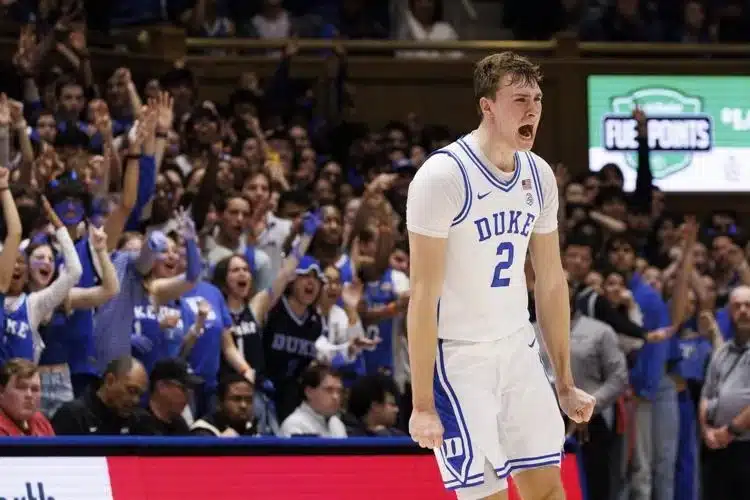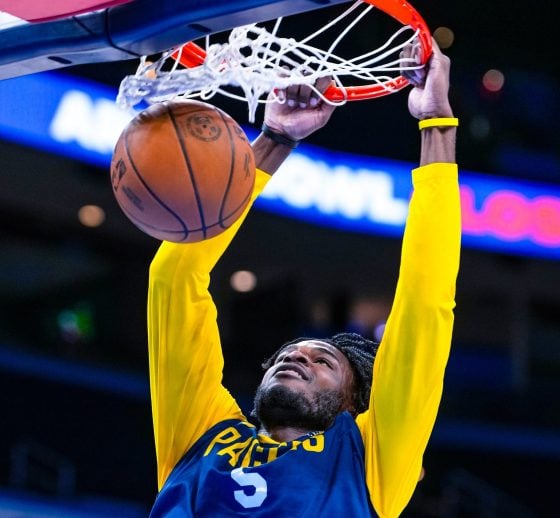It’s 4 am somewhere and James Edwards’ alarm begins to shriek. Bleary-eyed, he tries to remember where he is: What city, what hotel and what time does his plane take off? Can he take a shower, and get a quick breakfast? And where is he headed next – Toronto, Atlanta, L.A.?
Edwards, who is the beat reporter for the Detroit Pistons, employed by The Athletic, has been covering the team for seven years and it’s another losing season. It’s an epic poem of a losing season. Detroit is the worst team in the league and it recently endured a 28-game losing streak. Yet, Edwards dutifully tracks the team, coming up with stories and wondering both aloud and in print if there is light at the end of the tunnel.
If Edwards was a member of the team, he would fly charter, taking off after the games, win or lose, and get some rest in the cushy confines of the jet. Then he’d touch down with the squad and check into a first-class room in the hotel to get some more rest before the morning shootaround at 10 or 11 a.m. But Edwards is a journalist, one not afforded these amenities. And in 2024, he doesn’t have the luxury of having beers in hotel bars with stars like Isiah Thomas or Larry Bird, as some of his 1980s predecessors like Bob Ryan or Dan Shaughnessy did back when. For beat writers, there are no flights after games. Instead, it’s writing up the game story before heading back to the hotel to catch a few hours of sleep ahead of an early morning alarm.
But Edwards doesn’t complain. This is the career he’s chosen. He loves basketball and he’s excellent at his profession. This year, alone, he’s spun stories about mind-blowing losses; concerns about the team’s new high-priced coach; young players improving (or not); injuries; and even the anniversary of the NBA’s highest-scoring game. He knows what it takes to thrive in the job, even if it is a grind. He knows that people skills, maintaining curiosity, and earning trust are paramount. So, too, is keeping a level head on long and at times isolating road trips as he flies commercial to meet up with the team comprised of millionaires that he’s covering.
When you have 9 and 4 in you but they don’t believe you pic.twitter.com/QP1CIkhMJD
— James L. Edwards III (@JLEdwardsIII) January 1, 2024
In the seven years, he’s chronicled the squad, the Pistons have had only one non-losing season, and even then they were 41-41. Blake Griffin was on the team and it was the sole one during Edwards’ tenure that Detroit made the playoffs, a 4-0 sweep at the hands of the Milwaukee Bucks in 2018-19.
“It definitely takes a toll,” Edwards says of the grind. But that’s not the only thing he has to worry about. Like the athletes he covers, his work is public. It’s out there for the world to see and dissect. Just as players get critiqued and even trashed online, Edwards hears it from fans who might disagree with his take on a given game, trade, or prognostication.
“There’s a lot of killing the messenger,” he says, with a laugh.
Edwards got the job when he was 25-years-old. A graduate of Michigan State University, in the early days of The Athletic, his name was recommended to the higher-ups and they hired him. Now, as a beat reporter for the team, he writes stories, podcasts, and tweets. But the job is also about building trust with a franchise, relationships with players and coaches, and recognition with readers. He’s with the team upwards of six days a week, following them on home games and ones on the road.
“There’s a lot of time spent in airports,” he says.
But when at practice or covering games, it’s about the exchange of ideas with a touch of humanity.
Sometimes, Edwards says, he doesn’t speak to guys with a microphone in hand. It’s not always about getting the scoop. The job is just as much about laying the groundwork for long-term trust. The smallest detail can lead to the next big story, but one can’t always be a hound for it. This is a people business, after all, and give-and-take should be prized. Unique stories are built on a keen eye and a warm temperament. Not just dogged enthusiasm. He talks with the equipment manager as well as the No. 1 draft pick. The assistant coach and the one leading the team. The key, he says, is “Being human and not always looking for it to be transactional.” He has conversations about people’s lives – not just the wins and losses, assists and turnovers.
It also helps to be good. Because the 31-year-old Edwards has built a rapport and a level of quality as a journalist, people come to him now with story ideas, tips, and tidbits. But he can’t get those bits of information on places like the team planes, as some reporters used to be able to in the league’s Golden Era. And Edwards understands that, he says. Those are private spaces now. There is a healthy fear of the media and social media these days. Something someone says offhand, if caught on tape, could damage their standing in the league. Some spaces have to be left sacred. But that fact doesn’t make the 4 am alarm screech any easier.

MPS-USA TODAY Sports
For journalist Terry Foster, who used to cover the Bad Boy Pistons in the 1980s for The Detroit News, times were different in his day. But there remain a lot of similarities, too. While there were no social media then, there were rabid columnists like Peter Vecsey, who hunted for gossip that Foster would have to chase down, confirm, or refute. Like Edwards now, Foster was responsible for writing story after story about the team, from notebook dumps to gamers to features. He would get leads for tomorrow’s paper from tonight’s tilt after also writing up the summary of the night’s game. He built trust and developed relationships. Nothing was easy.
“I understand I was fed bullshit every day of my life,” Foster says. “But at some point, I wanted to know what the real deal was.”
So he sought it out face-to-face.
Foster remembers one occasion when he and former Piston Mark Aguirre jawed back and forth, half-joking, half-needling each other. Aguirre made fun of the beat writers, including Foster, for wearing sneakers to work. But Foster said they were required because the players always tried to duck out the backdoor and so he and his peers had to chase them down for quotes. But in that instance, by not backing down, Foster got a story. Specifically, Aguirre, who had Mexican heritage, took Foster aside and told him he might attempt to play for the Mexican team in the upcoming Olympics. “I couldn’t get that [story] if I didn’t know him,” Foster says.
He remembers another occasion when Piston legend Isiah Thomas got mad at him. Personal rumors had been swirling about Thomas and the All-Star guard had thought Foster was behind them (he wasn’t). So, Foster says, the two scheduled a “come to Jesus meeting” and ended up talking in a Chicago hotel room for three hours, ironing out the truth. They also ended up talking about their families, their upbringing, and their work. But still, it was daunting for Foster – who wants an NBA All-Star pissed at you?
“I think there’s a bridge or a wall between the athletes and the writers,” Foster says. “We keep that wall up because we want to be impartial. But sometimes that wall has to come down.”
The general rule of thumb is that a writer can criticize what happens on the court but don’t get personal. But what happens when those lines blur? And what happens if someone gets mad at you for what you wrote?
“Fans want you to write ‘this player sucks’ or ‘this coach sucks,’” Edwards says. “They don’t [always] understand there’s a way to point out flaws in a player, coach or organization without being over the top – by being respectful. Because you have to see these people every day.”
To aid this effort, Edwards leans on stats and in-game maneuvers. While he does write columns comprised of his opinion, even those must be backed up by facts and vetted information.
“If I do it respectfully,” he says, “I can live with [someone being] mad at me.”
In decades past, beat writers often had better access to the players. Even when a writer can connect with a big-time star today, there are often PR representatives seemingly guarding or protecting the athletes. Kerry Eggers, who covered the Portland Trail Blazers at the height of the team’s success in the early 1990s for The Oregonian, remembers even being able to build relationships with stars from other teams, including Michael Jordan. He remembers when media reps were there to facilitate stories, now he sees them too often as obfuscating them.
“The money has changed things,” Eggers says of the now multi-billion dollar NBA. “And more of the players are not willing to do media interviews. They don’t feel like they have to. I remember sitting down with Michael Jordan before games – just me for a few minutes. Now, that would never happen.”


USA TODAY Sports
Still, Eggers says, he has fond memories, like in 1992 when the Blazers beat the Phoenix Suns in the Western Conference playoffs and were on their way to making the NBA Finals for the second time in three years. At that same time, the team’s star Clyde Drexler had just been informed he was selected to the iconic Olympic Dream Team roster. So, Eggers asked Drexler, who was also the runner-up for MVP that year, for a quick side conversation in the locker room. Today, he has a framed photo from that moment with Drexler’s arm around him, the two talking. “That’s a neat memory,” he says.
Though the NBA season lasts from October to June, these days covering the league requires a year-round effort. While Edwards says he manages to take a week off here and there in the summer to recharge, he is still required to cover combines, workouts, the summer league, free agency, and trades. There is always more to write about and to react to. Always more to tweet and share on a podcast. But he manages it all because he loves the game and its participants, and he loves to tell stories. Most of all, however, he says, he simply gets a charge for informing people about something new.
“Telling die-hard fans something about their team that they don’t know,” Edwards says.” I feel like that is what my job is. And I take a lot of pride in that.”






